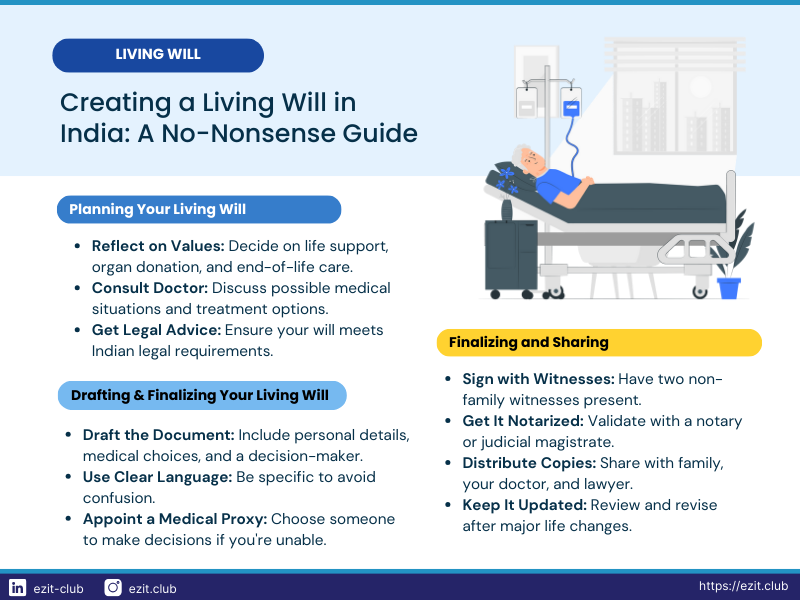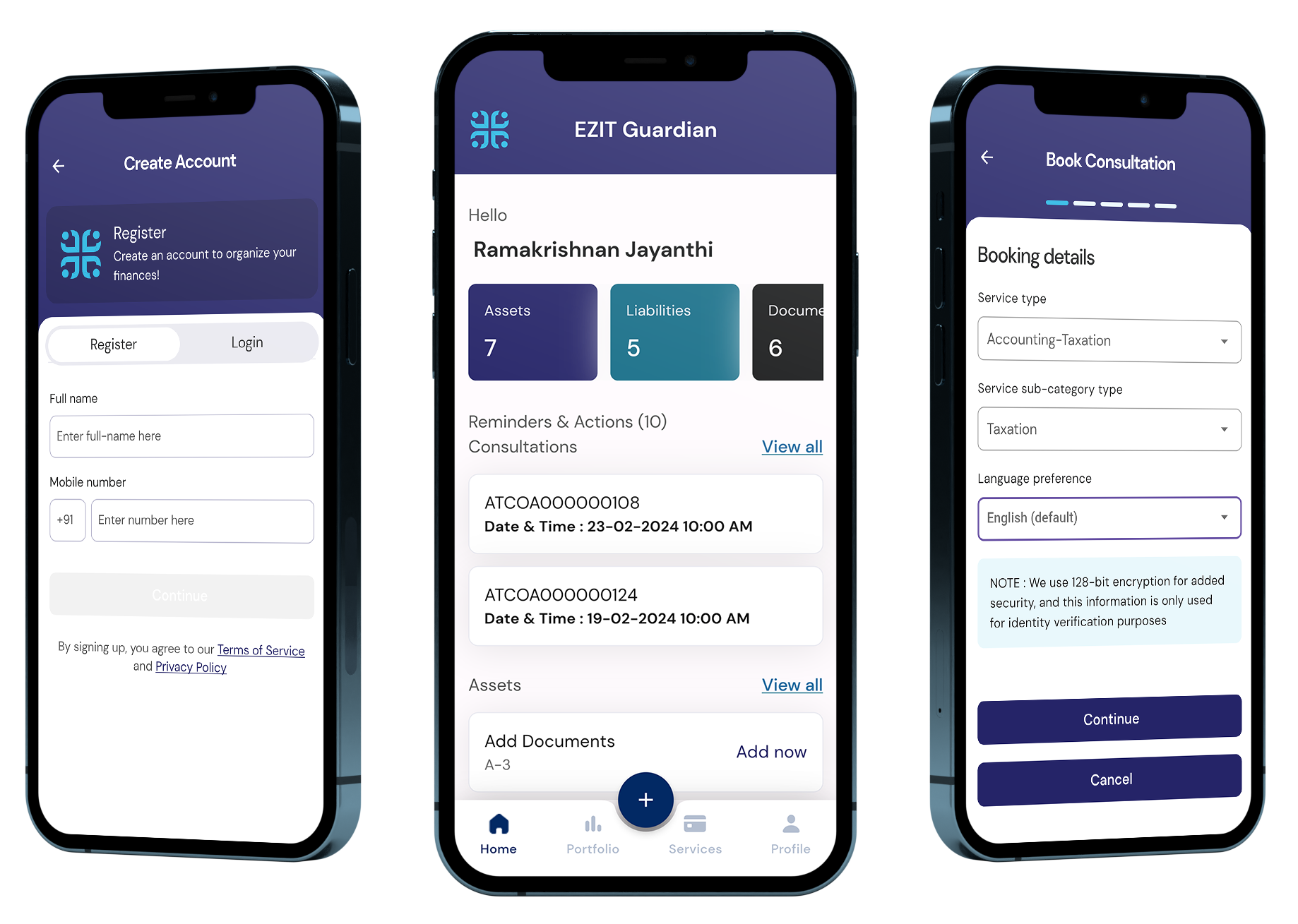TL;DR
Creating a living will in India involves careful consideration, legal consultation, and proper documentation. This guide outlines the step-by-step process to create a legally valid living will, ensuring your healthcare wishes are respected and legally binding.
Understanding the Importance of Living Wills in India
Before we dive into the how-to, let’s talk about why living wills matter. A living will, or advance medical directive, is your voice in critical medical situations when you can’t speak for yourself. It’s not just a document – it’s a powerful tool that ensures your healthcare wishes are respected, even if you’re unable to communicate them.
In 2018, the Supreme Court of India gave living wills the green light, marking a significant milestone in patient autonomy. But with great power comes great responsibility. Creating a living will isn’t just about jotting down your wishes – it’s about crafting a legally valid document that stands up to scrutiny when it matters most.
The Legal Landscape of Living Wills in India
Before you put pen to paper, it’s crucial to understand the legal framework surrounding living wills in India:
- Supreme Court Verdict (2018): The court recognized living wills as legally valid, emphasizing the right of individuals to make decisions about their medical treatment.
- Legal Requirements:
- The person creating the living will must be an adult of sound mind.
- The document must be signed by the executor in the presence of two attesting witnesses.
- A judicial magistrate must countersign the living will.
- It should clearly state that it can be revoked or modified at any time by the executor.
- Ongoing Developments: The Ministry of Health and Family Welfare is working on comprehensive guidelines for the creation and execution of living wills. Stay informed about any new regulations that may affect the process.
Step-by-Step Guide to Creating a Living Will
Now, let’s walk through the process of creating a living will:
1. Self-Reflection and Decision Making
Before you start drafting, take time to reflect on your values, beliefs, and preferences regarding end-of-life care. Consider various medical scenarios and decide on your preferences for treatments like:
- Life support systems
- Artificial nutrition and hydration
- Pain management techniques
- Organ and tissue donation
- Palliative care options
2. Consult with Healthcare Providers
Your doctor is your ally in this process. Schedule a consultation to discuss:
- Your current health status
- Potential future health scenarios based on your medical history
- Different treatment options and their implications
- The practicality of your healthcare preferences
This medical insight will help you make informed decisions about your future care.
3. Seek Legal Advice
While it’s possible to create a living will on your own, consulting a lawyer who specializes in healthcare law can be invaluable. They can:
- Ensure your living will complies with current Indian laws
- Help you navigate the complex legal terminology
- Advise on the proper execution of the document
- Assist in nominating a healthcare proxy
4. Draft Your Living Will
Your living will should include:
- Personal Information: Full name, address, age, and other identifying details.
- Declaration of Intent: Clearly state that this document is your living will or advance medical directive.
- Medical Conditions: Specify the situations when your living will should take effect (e.g., terminal illness, persistent vegetative state).
- Treatment Preferences: Detail your wishes for various medical interventions. Be specific about:
- Resuscitation preferences
- Mechanical ventilation
- Artificial nutrition and hydration
- Dialysis
- Antibiotics and other medications
- Palliative care options
- Healthcare Proxy: Nominate a person (and alternates) to make medical decisions on your behalf if needed.
- Organ Donation Wishes: If applicable, state your preferences regarding organ and tissue donation.
5. Use Clear and Specific Language
When creating a living will, it’s crucial to use precise and unambiguous language to ensure your wishes are clearly understood and followed. Avoid vague or subjective terms that could be open to interpretation. Instead, be specific about your preferences for medical treatments and end-of-life care.
For example, instead of a general statement like “I want to die with dignity,” which can mean different things to different people, you might specify:
“If I am diagnosed with a terminal illness or injury from which I am not expected to recover, and I am unable to make decisions for myself:
- I do not wish to be placed on artificial nutrition or hydration.
- I request comfort care measures to manage pain and other symptoms.
- I consent to the use of antibiotics only if they will provide comfort, not to extend life.”
By clearly outlining your preferences for specific medical interventions and situations, you provide concrete guidance to healthcare providers and family members, reducing the risk of misinterpretation during critical times.
6. Include a Healthcare Proxy
Choosing a healthcare proxy (also known as a medical power of attorney) is crucial. This person will make decisions on your behalf if you’re incapacitated. Choose someone you trust implicitly, who understands and respects your wishes.
Pro Tip: Have in-depth conversations with your chosen proxy about your values and preferences. The more they understand your wishes, the better they can advocate for you.
7. Sign and Witness the Document
To create a legally valid living will in India, you must sign the document in the presence of two attesting witnesses. Remember:
- The witnesses should not be related to you
- They should not stand to benefit from your estate
- Both witnesses must be present at the same time when you sign
8. Get it Notarized
Take your signed living will to a notary public or a judicial magistrate. Their countersignature is crucial for enhancing the legal validity of your document in India.
9. Distribute Copies
Once your living will is complete, provide copies to:
- Your healthcare proxy
- Alternate proxies (if named)
- Close family members
- Your primary care physician
- Your lawyer
Consider storing a digital copy with EZIT Guardian’s secure DocVault for easy access when needed.
10. Regular Review and Updates
Life changes, and so might your healthcare preferences. Set reminders to review and update your living will periodically, especially after:
- Major life events (marriage, divorce, birth of children)
- Significant changes in your health status
- Advancements in medical treatments relevant to your conditions
Common Pitfalls to Avoid while Creating a Living Will
When creating your living will, steer clear of these common mistakes:
- Using Vague Language: Be specific about your wishes to avoid misinterpretation.
- Overlooking Emotional Impact: Consider how your decisions might affect your loved ones.
- Failing to Update: Life changes, and your living will should reflect that.
- Not Discussing with Family: Open communication can prevent conflicts later.
- Ignoring Legal Requirements: Ensure your document meets all legal criteria for validity in India.
Storing and Accessing Your Living Will
A living will is only effective if it’s accessible when needed. Consider these storage options:
- Keep the original in a secure but accessible place at home
- Give copies to your healthcare proxy, family members, and doctors
- Store a digital copy in EZIT Guardian’s secure DocVault
EZIT Guardian offers a robust solution for storing and managing your living will:
- Secure DocVault: We use advanced encryption to keep your living will safe and confidential.
- Nominee Management: Easily assign and manage nominees who can access your living will when necessary.
- Family Support: Ensure your family can quickly access your living will in critical situations.
Take control of your future healthcare decisions today. Download free advance medical directive template now and ensure your wishes are clearly documented. Don’t leave your care to chance – act now to protect your autonomy and give your loved ones peace of mind.
Conclusion
Creating a living will in India puts you in control of your medical care, even when you can’t speak up. By following this guide and using secure storage like EZIT Guardian, you’re setting yourself and your family up for less stress when it really counts.
Ready to take control of your healthcare decisions?
Ready to take the wheel on your future medical care? Draft your living will and give EZIT Guardian a spin with our 90-day free trial. We’ll keep your document safe and sound, so it’s there when it matters most. Download the EZIT Guardian app from the Google Play Store & App Store today to schedule a consultation.
By creating a living will and securely storing it with tools like EZIT Guardian, you’re not just planning for the future – you’re taking an active role in shaping it. You’re ensuring that your healthcare wishes are preserved and accessible when needed, providing peace of mind for you and clarity for your loved ones.


